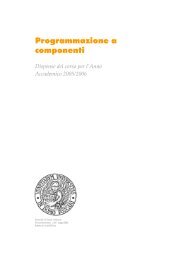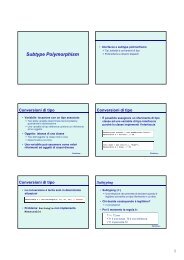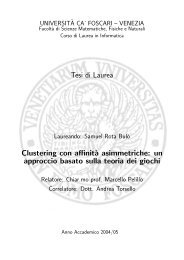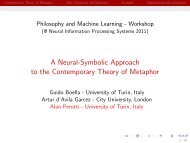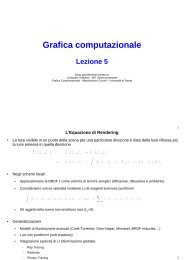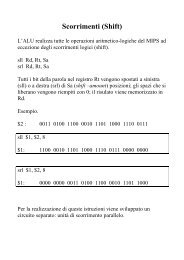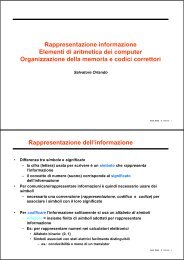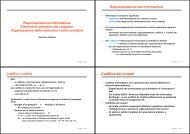Foscari - Dipartimento di Scienze Ambientali, Informatica e Statistica
Foscari - Dipartimento di Scienze Ambientali, Informatica e Statistica
Foscari - Dipartimento di Scienze Ambientali, Informatica e Statistica
Create successful ePaper yourself
Turn your PDF publications into a flip-book with our unique Google optimized e-Paper software.
Internet companies try to stop spam<br />
AOL and Yahoo both say they will offer new service<br />
Two of the world's biggest e-mail providers are preparing to charge companies for delivering large<br />
numbers of e-mails, which would otherwise be stopped by anti-spam filters. This report from our North<br />
American business correspondent Guto Harri:<br />
Spam is the Internet equivalent of junk mail. At best, it's unwanted; at its worst, it can be sinister or<br />
offensive. Various software systems have been developed to block it and some are pretty effective. But<br />
legitimate e-mail from big business is often filtered by anti-spam software, making it hard for the<br />
company to operate and depriving customers of potentially attractive offers.<br />
So in the next few months, Yahoo and AOL will try a <strong>di</strong>fferent approach. For less than a penny a piece,<br />
they're offering to deliver e-mails <strong>di</strong>rectly to people's inboxes, bypassing any anti-spam device.<br />
Sen<strong>di</strong>ng thousands or millions of e-mails would clearly incur a significant cost - but for that fee, the<br />
business would get a stamp of approval and authenticity. The customer could be reassured that the<br />
approach was genuine, and Yahoo and AOL would make a lot of money. Anyone who <strong>di</strong>dn't want to<br />
pay could carry on as before.<br />
Phrase definitions<br />
the Internet equivalent of junk mail<br />
the same thing on the Internet as letters, especially advertisements, that are sent by organisations to<br />
large numbers of people. We use the term 'junk mail' to show <strong>di</strong>sapproval.<br />
At best, it's unwanted; at its worst, it can be sinister or offensive<br />
if something is 'sinister', it makes you feel that something evil, dangerous, or illegal is happening or<br />
will happen. If something is 'offensive' it is very rude or insulting and likely to upset people. Notice the<br />
construction: 'at best ... at worst ...'. We use this to emphasise the negative aspects or qualities of<br />
something. We put the least bad quality first, then the worst.<br />
Are the following questions true or false? Read the text again and circle the correct answer:<br />
1. Letters that are sent to people's houses and offices is called 'spam'. T/F<br />
2. The most awful thing about spam is that it's something people don't want it. T/F<br />
3. Anti-spam software is very successful for both businesses and customers. T/F<br />
4. Yahoo and AOL are offering a new, cheap service to post emails <strong>di</strong>rectly to users, side-stepping the<br />
anti-spam programmes. T/F<br />
5. If businesses use this new service they will get a government certificate to say they don't send spam<br />
to their customers. T/F<br />
6. Every registered business will have to join Yahoo and AOL's anti-spam programme T/F<br />
Many people find it's easier to remember vocabulary if it's grouped together in a<br />
meaningful way.<br />
Below are words about IT (some from today's text) and some about the film industry<br />
Put the words into the correct category.<br />
47



